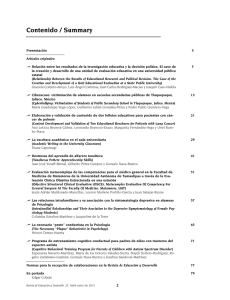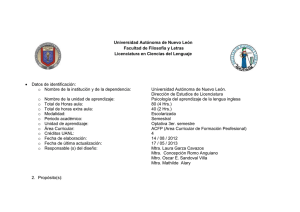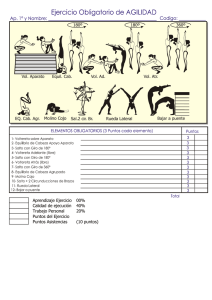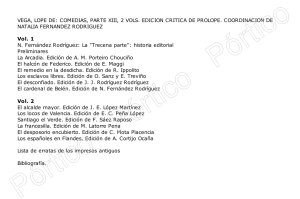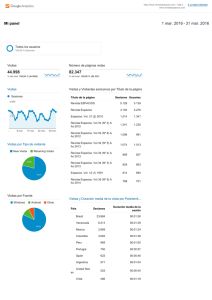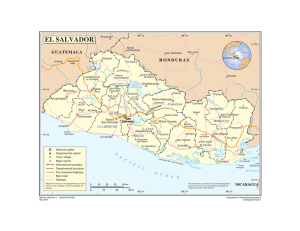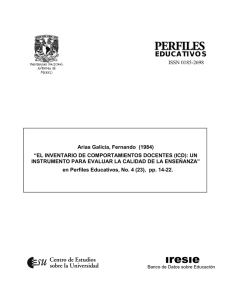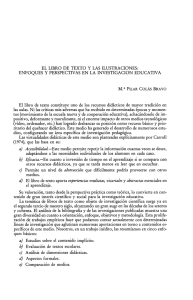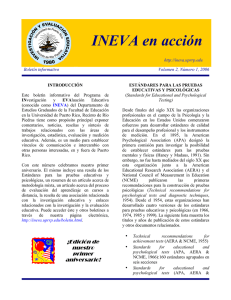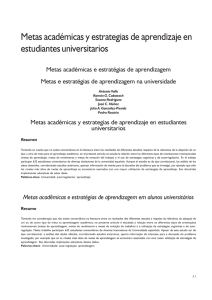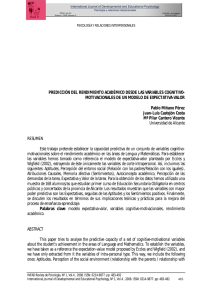1 REFERENCIAS Aiken, L. (1985). Psychological testing and
Anuncio
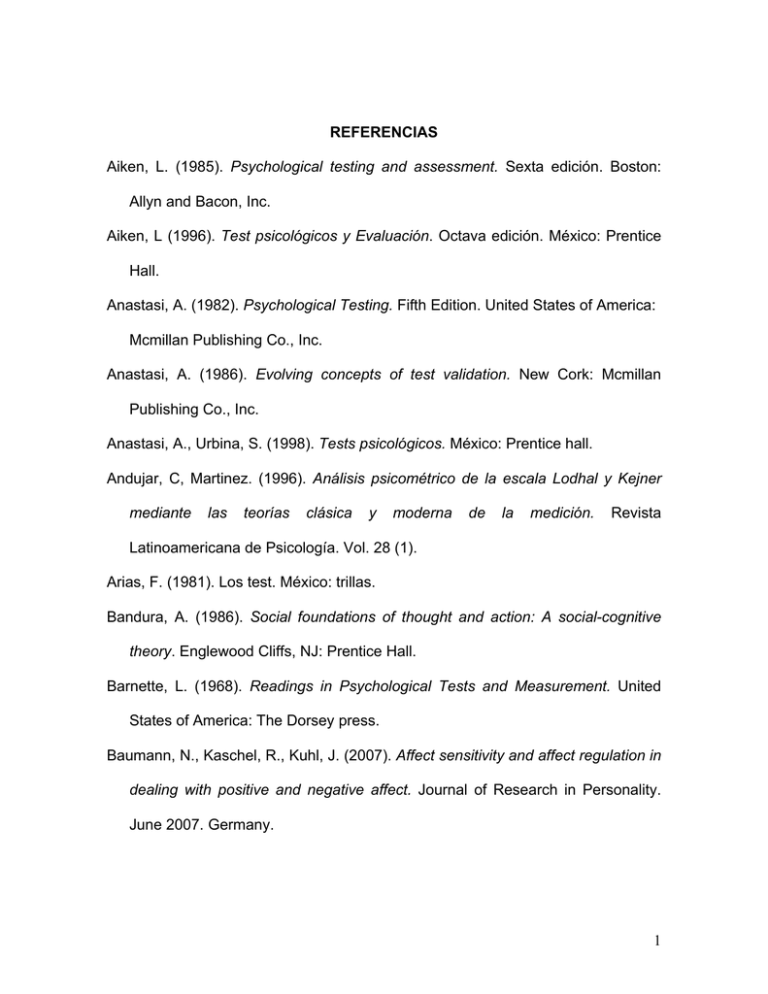
REFERENCIAS Aiken, L. (1985). Psychological testing and assessment. Sexta edición. Boston: Allyn and Bacon, Inc. Aiken, L (1996). Test psicológicos y Evaluación. Octava edición. México: Prentice Hall. Anastasi, A. (1982). Psychological Testing. Fifth Edition. United States of America: Mcmillan Publishing Co., Inc. Anastasi, A. (1986). Evolving concepts of test validation. New Cork: Mcmillan Publishing Co., Inc. Anastasi, A., Urbina, S. (1998). Tests psicológicos. México: Prentice hall. Andujar, C, Martinez. (1996). Análisis psicométrico de la escala Lodhal y Kejner mediante las teorías clásica y moderna de la medición. Revista Latinoamericana de Psicología. Vol. 28 (1). Arias, F. (1981). Los test. México: trillas. Bandura, A. (1986). Social foundations of thought and action: A social-cognitive theory. Englewood Cliffs, NJ: Prentice Hall. Barnette, L. (1968). Readings in Psychological Tests and Measurement. United States of America: The Dorsey press. Baumann, N., Kaschel, R., Kuhl, J. (2007). Affect sensitivity and affect regulation in dealing with positive and negative affect. Journal of Research in Personality. June 2007. Germany. 1 Baumert, J., Klieme, E., Neubrand, M., Prenzel, M., Schiefele, U., Schneider, W., Tillman, K., Weib, M. (1993).Self-Regulated Learning as a Cross-Curricular Competence. OECD PISA DEUTSCHLAND. Berlin. Boekarts, M., Cascallar, E., Costigan, T. (2006). Assessment in the Evaluation of Self-Regulation as a Process. Educ. Psycol Rev. Cabrera, V. (2004). Clima organizacional y compromiso organizacional. Studio de un caso. Memoria para optar al Título de Licenciatura en Psicología. Departamento de Psicología, Universidad de las Américas. Castro, L. (1984). Diseño experimental sin estadística. México: Trillas. Carrasco, J. (2000). Cómo aprender mejor. Tercera edición. Madrid: Rialp. Cerda, E. (1984). Psicometría general. Tercera edición. Barcelona: Editorial Herder. Correll, W. (1980). El aprender fundamentos psicológicos y problemática. Barcelona: Editorial Herder. Cronbach, L. (1970). Essentials of psychological testing. New York: Harper International editions. Cronbach, L. (1971). Essentials of psychological testing. New York: Harper International editions. Cronbach, L., Quirk. (1976). Test validity. New York: McGraw-Hill. Embretson, S.(1985). Test design: developments in psychology and psychometrics. New Cork: Academia Press Inc. García, T., McCann, E., Turner, J., Roska, L. (1998). Modeling the Mediating Role of Volition in the Learning Process. CONTEMPORARY EDUCATIONAL PSYCHOLOGY Vol. 23. Pag. 392–418. NO. EP980982. Austin. 2 Husman, J., Schallert, D., Turner, J. (2002). The Importance of Students’ Goals in Their Emotional Experience. Educational Psychologist Kitsantas, A., Zimmerman, B. (1997). Developmental Phases in Self-Regulation: Shifting From Process Goals to Outcome Goals of Academic Failure: Investigating the Precursors and Consequences of Shame. Journal of Educational Psychology.1997, Vol. 89, No. 1, 29-36. New York. Kuhl, j., Kázen, M., Koole, L. (2006). Putting Self-Regulation Theory into Practice: A User’s Manual. APPLIED PSYCHOLOGY: AN INTERNATIONAL REVIEW, 2006,55 (3), 408–418. Amsterdam Lenon, R. (1956). Assumptions underlying the use of content validity. United States of America: McGraw Hill. Mccann, E., García, T. (1999). Maintaining motivation and Regulating emotion: measuring individual differences in academic volitional strategies. VOLUME 11, NUMBER 3,. Texas. McCann & Garcia, 2000. The Academic Volitional Strategy Inventory (AVSI) McCann, E., Turner, J. (2004). Increasing Student Learning Through Volitional Control. Volume 106, Number 09. Columbia University. Novick. (1984). Importance of professional standars for fair and appropriate test use. San Francisco: Jossey-Bass. Nunnally, C. (1991). Teoría psicométirca. México: Paidós. Oort, F., Vrugt, A., Zeeberg, C. (2002). Goal orientations, perceived self-efficacy and study results amongst beginners and advanced students. British Journal of Educational Psychology (2002), Vol. 72, Pages. 385–397. England. 3 Pereira, L. (2005). La autorregulación como proceso complejo en el aprendizaje del individuo peninsular. Polis revista de la Universidad Bolivariana, año/vol. 4, número 011. Santiago, Chile. Pintrich, P. (1999). The role of motivation in promoting and sustaining selfregulated learning. International Journal of Educational Research. (1999) Vol. 31. Pages. 459-470. United States of America. Pintrich, P. (2000). Multiple Goals, Multiple Pathways: The Role of Goal Orientation in Learning and Achievement. Journal of Educational Psychology 2000, Vol. 92, No. 3. 544-555. United Status of America. Rivero, M., Prada, A. (2005). Aprendizaje autodirigido y desempeño académico. Tiempo de educar, enero-junio, año/vol. 6, número 011. Toluca, México. Shavelson, R. (1981). Statistical Reasoning for that behavioral sciences. Boston: Library of congress cataloging in publication data. Silva, F. (1989). Evaluación conductual y criterios psicométricos. Madrid: Pirámide. Thorndike, R. (1986).Test y técnicas de medición en psicología y educación. México: Editorial Trillas. Vernon, P. (1964). The concept of validity in personality studies. Londres: McGrawHill. 4
